2020 has been an unimaginably challenging year for tech startups. Even with the digitalization opportunities opened up by the impact of COVID19, founders navigated uncharted territory when it came to managing remote teams, acquiring and retaining clients, and fundraising in the new normal. From their experiences many inspiring stories of resilience have emerged, and to close 2020 we tell one such story from our portfolio.
Despite the negative impact of COVID on lending and financing businesses in Indonesia, AwanTunai has been able to grow their loan book 2x, secure an OJK lending license and raise a $20 million debt facility all while keeping their NPLs below 1%. They also leveraged on the COVID opportunity to digitize more services for SMEs, introducing new products like AwanToko and AwanGrosir.
And who better to get on-call from AwanTuani than a leader who’s been driving this growth on-the-ground? Windy Natriavi, AwanTunai’s chief product officer and co-founder, shares with us the ingredients for AwanTunai’s resilience. This call was recorded 26th of November, 2020.
Highlights
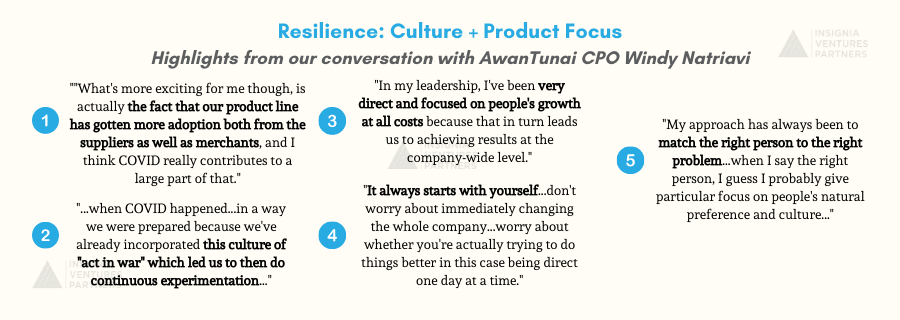
Highlights from our conversation with AwanTunai CPO and co-founder Windy Natriavi
Timestamps
00:59 Windy’s 2020 and Intro;
02:44 What are the key factors that enabled AwanTunai to be resilient?;
04:17 AwanTunai’s company culture;
07:46 How Windy’s Gojek career influenced her AwanTunai leadership;
09:49 How to embrace a culture of radical candor;
12:45 Windy’s approach to hiring product roles;
Transcript
Paulo: Welcome everyone to On Call with Insignia, where we go on call with Southeast Asia, emerging technology, startup leaders, and investors.
Today our guest is from AwanTunai, an Indonesian SME financing tech company with whom Insignia has been privileged to partner since they began this year. Despite the negative impact of COVID on lending and financing businesses in Indonesia, AwanTunai has been able to grow their loan book 2x, secure an OJK lending license and raise a $20 million debt facility all while keeping their NPLs below 1%. At the same time, they’ve leveraged on the COVID opportunity to digitize more services for the micro merchants they serve, introducing new products like AwanToko and AwanGrosir.
While AwanTunai’s growth and achievements are testaments to their resilience as a company in a badly hit industry, at the heart of AwanTunai’s resilience is ultimately company culture and product focus. And that’s why today I’ve invited AwanTunai’s chief product officer and co-founder Windy Natriavi to share with us how culture and product enabled their company to ensure amidst the crisis.
Welcome to the show Windy. And how’s your 2020 been?
Windy: Hi Paulo. Thank you so much for the very warm welcome. Well, you know, 2020 It’s been quite good, actually. It’s tough for sure. But it’s been eventful, right? AwanTunai, as you mentioned, has particularly been quite innovative and we’ve actually pushed the boundaries for a lot of what we used to think was possible.
And even, on my personal side, you know, I managed to improve my quality of life significantly, explore some hobbies and even created a side venture called WomanWorks.
Paulo: It’s really great to know that you’ve not only been part of how AwanTunai has responded to the crisis and grown out of the crisis, but also have been doing your own, personal projects as well, which are empowering women in the tech sector, especially. And I remember, the last time that Windy and I spoke was a year ago and since then, Windy has been very helpful in sharing a lot of insights through our blog and more recently in our book as well to fellow entrepreneurs in the Southeast Asian ecosystem. So really thankful for all the insights that you’ve shared so far and excited to hear some more of them today.
Read Windy’s best practices on experimentation >>>
Order a copy of the book Navigating ASEANnovation >>>
So before we begin, actually, I just like to share a bit more to our audience about Windy in case, you don’t know her yet. So before AwanTunai, she was part of Go-Jek’s early management team co-founding and becoming VP of GoLife, and then VP of growth, the team behind Go-Jek’s first promo engine, referral engine, and cross sell voucher systems.
Previously, she was an analyst at McKinsey and she graduated from the prestigious University of Indonesia with a degree in finance. And as you mentioned earlier, aside from leading product and growth from one to nine these days, she is also co-founder and CEO of, WomenWorks, a women-first connection marketplace in Southeast Asia.
So I’m really excited to have you on our show finally, and our listeners, if you’ve tuned into AwanTunai CEO Dino’s episode, several months ago, actually he’s mentioned a lot of great things about you as well.
So to kick things off, I asked you earlier about how 2020 has been for you personally, but now I would like to know how 2020 has been for AwanTunai, from your perspective as a chief product officer. What are, in your opinion, the key factors that enabled AwanTunai to be resilient, operating in the lending and financing space?
Windy: Right. So I guess, we’ve more than doubled our monthly disbursements, as I mentioned, and we are now present in around 10 cities. So we’ve expanded really big, actually, even despite these COVID restrictions and we’re definitely on track to achieve what our disbursement targets. So that’s really happy news for me as we’re ending this year.
And what’s more exciting for me though, is actually the fact that our product line has gotten more adoption both from the suppliers as well as merchants, and I think COVID really contributes to a large part of that.
When you’re talking about the key factors, right, Paulo, I guess definitely I would mention culture. Our culture plays a really strong part and also our focus on figuring out additional points and segments that we can solve beyond our current line of operations. As you’ve mentioned earlier, we have now expanded into AwanToko and AwanGrosir, which is actually a supply chain SaaS system.
So we also offer online orders. We offer inventory management and we also offer basically POS and, in some cases, mobile POS for a lot of our suppliers and merchants to help them manage the business. So it’s been quite a great year for us.
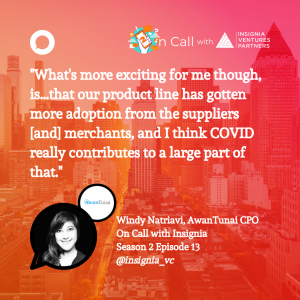
What’s more exciting for me though, is actually the fact that our product line has gotten more adoption both from the suppliers as well as merchants, and I think COVID really contributes to a large part of that.
Paulo: Right. It’s really running counter to what everybody else in the space has been experiencing. And it’s been a really busy time for you guys. And you mentioned two things, right? The key factors that helped the company throughout this period. The first one you mentioned was culture. And I’d like to talk about that a little bit.
So how would you describe AwanTunai’s company culture and how does it reflect, in the company’s offerings and in the on-the-ground operations of the company?
Windy: Sure. Well, you know, we had a pretty tough year in 2019 in which we had to pivot basically. And this lesson of pivot basically taught us so many important things. And one of it is our value of act like in war, right? So I think this culture of acting in war is basically realizing that at any given moment, competitors can be coming in. You can actually have some external factors that can really disrupt your business in which it actually did back in 2019. Right.
So I think we really put that into heart and when COVID happened, there was shock period for most of the entrepreneurs, but for us to be very frank, of course you were shocked and we were disappointed, and very sad, with the state of the economy, but in a way we were prepared because we’ve already incorporated this culture of act in war which led us to then do continuous experimentation and just to give a real example, right?
So during this COVID times, we were basically, really afraid of our lending book, how will it actually turn out? And so, you know, we had to actually shut down, temporarily, part of our merchants that we did not feel comfortable with and we were kind of like wondering right on how they would survive this, but then, we still have disbursement targets to fulfill, so then the question becomes, okay, how are we basically going to compensate for this? Right?
Because of this act of war and continuous experimentation, we went down to the ground, as always, and we basically set up and we asked you know, the suppliers what are their current pain points, what are their worries?
And we actually stumbled upon something that we, in the past, did not think before. So it turns out that a lot of our suppliers now are worried about their own financial operations cashflow, and actually, we definitely know a lot about their business as well. And we can definitely understand which of our suppliers are worth to be given loans.
So then we started expanding into supplier financing within only one month and we use this actually as a key hook as well for adoption during this tough time. So we were saying, okay, you know what, if it turns out that you want supplier financing, which every one of them at this moment in time does, especially given COVID, then you’ll have to actually get your merchants to start transacting at your store using our online orders so that we can actually see, what your transactions really are.
Right. And what are the SKUs? And have our data team run the analysis to see whether this SKUs are indeed the type that will be resilient in an economic downturn. So that part of really just being in the act of war and continuous experimentation really played a lot.
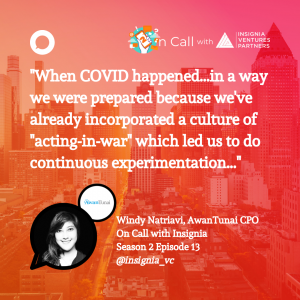
…when COVID happened…in a way we were prepared because we’ve already incorporated this culture of act in war which led us to then do continuous experimentation…
Paulo: Right. I think there are two interesting points that you mentioned, one is obviously you guys are, as you said, always, in war mode right? And I think, you don’t have to be prepared if you’re always prepared. And the second interesting point that you mentioned was that it was actually AwanTunai’s effort to become resilient that actually also helps your customer also become resilient. Cause if they have more visibility on their data and their transactions, they’ll be able to go through these tough times better.
Windy: Exactly. And we can also let them know, right, like, “okay, you know what, these merchants and suppliers that are basically really surviving, they are having more of this type of SKUs and we can actually then suggest that other suppliers and merchants hold the similar type of SKUs as well.
Paulo: And that’s where AwanToko and AwanGrosir come in, I guess. Right, right. Yeah. Yeah. There’s the big picture, looking in hindsight. And speaking of, connecting the dots and big pictures, I also wanted to ask about your past experiences in Go-Jek. In a previous episode, we also interviewed one of your former colleagues, Dara, about her experiences there.
And I also wanted to get your own, personal views about it and how it influenced how you developed AwanTunai’s culture of being on the ground with the customers and even your own leadership as a chief product officer.
Windy: Right. Well, you know, one trait basically in particular that I learned from my old boss and mentor Nadiem. And I have him to be really grateful for this is basically speaking up and being direct, right. And I think this is a trait that’s very lacking in Asian culture and hence, you know, a lot of lacking, right, in a lot of our Asian leaders, especially women, I would say.
So back then, when in Go-Jek right, I would always be messaged or told in a way that is quite direct, right, not rude, but very direct. And this actually allows me to really improve myself and initially it was kind of a shock to be given such direct feedback, but then over the months, I would have to say, it’s really been liberating because then, you can actually grow from this, after you get from the initial part of accepting it and then actually realizing, “Wait a minute. I am able to be in this position where I learn how I can improve in the feedback, right?”
This I think is really, really important because when you are talking about building a company that focuses on growth which is one of AwanTunai’s company culture. You cannot do it without feedback, direct feedback. It’s not only the fact that you give feedback, but also when you give feedback. The timing matters. Like this loop of feedback is something that we want to always have in our team. So, you can ask yourself “How long does it take for you to basically give feedback after a meeting to a colleague you felt were not performing their best?”
“Or how long does it take for you to resolve any tension that you may have with a fellow colleague or your boss, right?” And so this is really, really important and in my leadership, I’ve been very direct and focused on people’s growth at all costs because that in turn leads us to achieving results at the company-wide level.
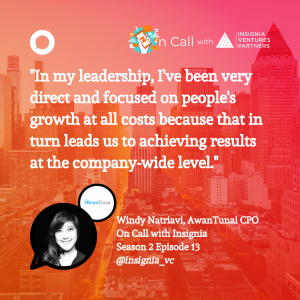
In my leadership, I’ve been very direct and focused on people’s growth at all costs because that in turn leads us to achieving results at the company-wide level.
Paulo: Right. And you mentioned about all of this, creating those feedback loops, being direct. How would you advise other people, in Indonesia, to embrace that kind of attitude, especially, you know, if the workplace doesn’t really have that kind of culture?
Windy: Right. So I think I’ll answer like two parts, right to this. So the first one is how can you develop yourself to be more direct. And second is then how can you influence the whole organization to be direct, right?
So the first one I would say is realizing that there is a matrix. And I really love this book by Kim- something, I’m sorry, I forgot the author’s name, but basically it’s called “Radical Candor” and it basically has an X-axis and a Y-axis. So the Y-axis is how close you are in personal. And also the X-axis is how direct you are basically, how able you are in improving this person or being candid. And you know what it actually goes hand-in-hand.
So the more that you develop good relationships with another person, the more that you feel comfortable. And the more that this person actually believes that, you know, when you’re giving feedback, it’s actually for their growth. It’s actually for their improvement. And who would not want to be given a quick dose of improvements, and that’s what direct is but direct does not mean to be rude, but you know, it means that when you are afraid that someone is not pulling their weight, you actually say that to them, right?
Like, “Hey, I’m afraid you’re not pulling your weight in let’s say the recent design review, What’s happening?” So I think that the first one is obviously developing close enough relationships. No need to be best friends, but then basically need to care about this person and do it in a way that’s genuine.
So that’s also something that I learned from Nadiem as well. He would definitely kind of message me every time he sees that he thinks I’m not doing okay, and I think that really makes me feel that he cares about me as a person.
Then the other one is basically how do you influence other people. And I really, look at this as well for my co-founders. I learned a lot from my co-founders Rama and Dino. I really feel that they are very direct in, how they say things. If they have an issue, they just call me and I think that’s really, really good.
And I think the key is number one is to make sure that you have this culture within at least C-level. And then, you go down into your management level because people will basically emulate leaders. If they see the leaders not being direct well, you cannot expect the team to be direct and it always starts with yourself. It always starts with yourself. So, don’t worry about immediately changing the whole company within one day, but worry about whether you’re actually trying to do things better in this case being direct one day at a time.
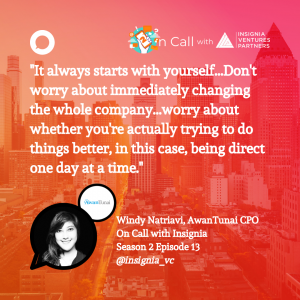
It always starts with yourself…don’t worry about immediately changing the whole company…worry about whether you’re actually trying to do things better in this case being direct one day at a time.
Paulo: Right. I think the most comforting part of what you said is that it is possible. That it’s something that you can do, even if your company doesn’t necessarily have that kind of culture yet, that you can start with yourself.
And speaking of building a culture and getting talent together, recently you’ve also been actively hiring, in line with all of these different projects that you’ve been working on at AwanTunai. So what has your approach been to hiring specifically for these product roles at the company? And what factors do you look out for in terms of talent?
Windy: Okay. So I think first of all, it’s really an exciting time. I’m seeing so many talents coming back to the workforce and especially women. And when you talk about product, you have to realize that I think most, if not, at least more than 50% in most apps or software products, the customers are women.
Definitely that’s the case back when I was in Go-Jek as well. And the fact is that, even if they’re not primarily the main consumer, in the decision-making, women or let’s say, our merchants’ wives, suppliers’ wives play such a huge role, so, an unspoken role. Yes. And it’s very often that I see their wives or their daughters becoming COOs of their stores. It’s very interesting. So I think first, I would like to just say that and basically encourage more women to really come back to the workforce.
But coming back to your question, right, so what has been my approach? So I think my approach has always been to match the right person to the right problem. So, obviously you would want to look at their technical talents that’s a given. But when I say the right person, I guess I probably give particular focus on people’s natural preference and culture, more than what I find other product leaders would put such a strong focus on.
Right. So for example, I think in my experience there have been four different skillsets or four types, I would say, of product managers. And yes, you do have to have a little bit of, each, in each product manager, but there will definitely be stronger skillsets that you need. So let me just give you a clear example, right?
So for me, there are four types. There’s explorer, there’s advocate. There’s a technician and there’s an organizer. And let’s say I want to hire for an internal PM. I would definitely look for people that are strong in their abilities to be technical and strong in terms of stakeholder management or organizing systems and processes.
Because that’s what you do in internal. You know, you need to make sure that things are going well within the organization. But then if I were to basically, let’s say search for a PM, that’s building our new product line for our suppliers, for example, I would focus more on people who have strong traits in them as an explorer and advocate.
So explorer is, you know, those people that are basically interested in innovative ways, you know, they’re interested in how they can implement new technologies to a new problem. And advocate is a PM that really focuses on customers. For them, you know, impact is when the customer is happy.
And so those are the traits that I would look for. And so, you have to strike the right balance and, I will say match the right people with the right problem.
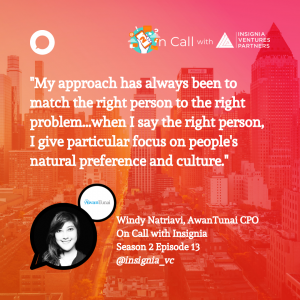
My approach has always been to match the right person to the right problem…when I say the right person, I guess I probably give particular focus on people’s natural preference and culture,
Paulo: The roles that you mentioned, does this come from a framework? Is there a name for this or, in case our listeners would be interested to search this up.
Windy: Oh, right, right. So you know, I’m a natural explorer. So I always look at and search for new ways of product and management. And basically there’s this conference called “Productized.” So you can search for it on YouTube. It’s P-R-O-D-U-C-T-I-Z-E-D. It’s basically a conference for product management and yeah, there was like one speaker that mentioned about this and, you know, when I reflected, I realized, you know what, it is really true. It’s what I’ve seen on a daily basis.
Paulo: Yeah. So for anyone who’s interested, I think you can just search “Productized” on YouTube. Yeah, and I think the earlier point that you mentioned about women at least in the AwanTunai business, right, having such an influential and, yet, you know, understated role, in consumer decisions. It’s something, people don’t really pay attention to that often. And I really hope that you’re able to welcome more women into the workforce, especially in AwanTunai as well.
About our guest

Windy Natriavi is the Chief Product Officer and a co-founder of AwanTunai. before AwanTunai, she was part of Go-Jek’s early management team co-founding and becoming VP of GoLife, and then VP of Growth, the team behind Go-Jek’s first promo engine, referral engine, and cross sell voucher systems.
Previously, she was an analyst at McKinsey and she graduated from the prestigious University of Indonesia with a degree in finance. And as you mentioned earlier, aside from leading product and growth from one to nine these days, she is also co-founder and CEO of, WomenWorks, a women-first connection marketplace in Southeast Asia.